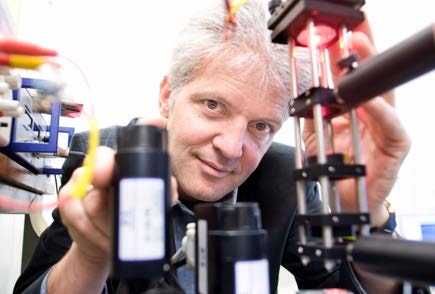Lecture 3
Building a synthetic cell from the bottom up
| Speaker | Distinguished Prof Cees Dekker, Kavli Institute of Nanoscience, Delft University of Technology, The Netherlands |
| Date/Time | Friday, 8 Nov, 10AM |
| Location | Lecture Theatre 32 |
| Moderator | Prof Sow Chorng Haur |
Abstract
In a futuristic project, we have started to explore the boundary between nonlife and life, by attempting to build a living cell from lifeless components. I will start my talk by providing some historic context and describing new national programs in the Netherlands that aim at building such a synthetic cell.
We are currently devising first steps aimed at ultimately realizing live synthetic cells that are constituted from lifeless biomolecules in a bottom up fashion. In this talk I will present some elements of that, viz., the definition of liposome containers, the building of a minimal divisome, and the spatial organization of a synthetic genome.
I will recap our various microfluidics strategies to encapsulate proteins in liposomes. I will describe our efforts where we explored various proteins that might constitute a minimal divisome, i.e., a minimal set of proteins that can establish the division of a mother liposome into daughter liposomes. I will present recent results on the bacterial protein Dynamin A (DynA) where we used FRAP fluorescence microscopy to study in vitro reconstituted DynA inside liposomes. Upon external reshaping of the liposomes into dumbbells, DynA self-assembled at the membrane neck, resulting in membrane hemi-scission and even full scission. DynA proteins were found to constitute a simple one-component division machinery that is capable of splitting dumbbell-shaped liposomes, marking an important step towards building a synthetic divisome.

Biography
Cees Dekker is a physicist who moved from quantum solid-state physics to nanobiology. In the 1990s, he pioneered nanotechnology and discovered many of the exciting electronic properties of carbon nanotubes, establishing the first single-molecule transistor. In 2000, he moved to single-molecule biophysics and nanobiology, applying nanotechnology to biological systems and enforcing various breakthroughs from DNA and protein sequencing with nanopores to DNA loop extrusion by novel motor proteins. His current research focuses on nanopores, chromosome structure, and developing synthetic cells. Characteristically, Dekker pioneers new fields and defines new directions, both organizationally in e.g. establishing the Kavli Institute and a new Department of Bionanoscience at Delft and spearheading international initiatives to build synthetic cells, but more importantly also scientifically – by pioneering molecular electronics and nanobiology yielding major discoveries from nanopore sequencing to DNA loop extrusion by motor proteins.
Read more: http://ceesdekkerlab.nl
